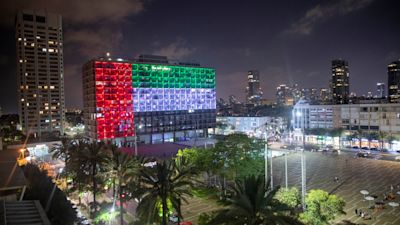Why Donald Trump and Benjamin Netanyahu's Israel peace deals are being greeted with fanfare

The Israeli Government and the White House are both keen to call them peace deals.
But Israel has never been at war with either the United Arab Emirates or Bahrain. Hostilities have never gone beyond cold shoulders.
Today’s ceremony is being talked up because the greater the fanfare, the greater the kudos for two central protagonists, Donald Trump and Benjamin Netanyahu.
Both leaders are under tremendous domestic pressure. Neither is deemed to have handled the coronavirus well.
In fact, Mr Netanyahu has handled it so badly that Israel will on Friday become the first country to re-impose a full lockdown.
Add to that the fact he’s currently on trial for corruption and you can see why the treaties being signed today are so important to him.
Here in Israel, some of Mr Netanyahu’s most vocal critics have labelled the ceremony a ‘propagandist’ formality in recognition of closer ties with the two Gulf nations that were established years ago.
But there’s more to it than that. The potential for trade and tourism is enormous.
Israelis love to travel and not only will the UAE be a new destination for them, well-connected Dubai airport can be a stepping-stone to the rest of the world.
For Emiratis, access to the Holy Land is a tantalising prospect. Not many foreign Arabs get to visit Jerusalem’s al-Aqsa Mosque, the third holiest site in Islam.
The relationship looks like it will be far warmer than the one shared between Israel and the two other Arab nations with which it has formal ties, Egypt and Jordan. But then, Israel has fought wars with both those neighbours.
It’s unlikely today would have happened without the contribution of another regional power – Iran.
The Israelis and the Sunni Arab nations of the Middle East have looked on in horror as Iran’s influence has extended westwards over the last decade.
Now the UAE and Bahrain are allies of the most advanced military power in the region .
For their part the Israelis will hope to eventually have access to Gulf air bases already used by the Americans, the French and the British, and to the Gulf ports. Bahrain is home to the US Navy’s 5th Fleet.
Today underlines the fact that Iran has become the number one issue for the Arab world. The Palestinian cause has been relegated.
The Arab consensus used to be that normalisation with Israel would only happen if the Palestinian issue was addressed.
Now the Palestinians feel sidelined and betrayed.
The Emiratis defend their deal with Israel by saying they exacted the price of a freeze of plans by Mr Netanyahu to declare sovereignty over parts of the occupied West Bank. It’s debatable whether or not he was ever going to carry out his threat to annex. If he was bluffing then it worked perfectly.
The Palestinian cause has never looked weaker. Optimists will argue that greater Arab engagement with Israel might achieve progress and that ostracising Israel has achieved nothing. Pessimists predict no change.